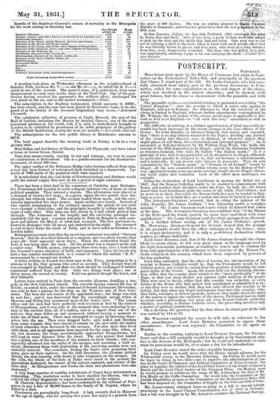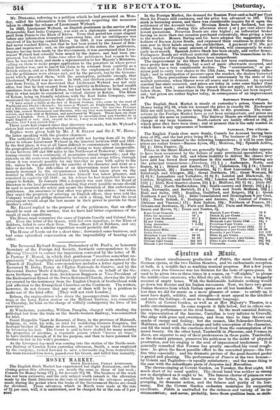POSTSCRIPT.
SATURDAY.
More hours were spent by the House of Commons last night in Com- mittee on the Ecclesiastical Titles Bill, and principally on the question that Clause I. stand part of the bill. Sir JAMES GRAHAM, who had care- fully abstained from taking part in the previous discussions in Com- mittee, called for some explanation as to the real import of the clause, which was involved in the utmost obscurity ; and he showed, with great fulness, that the clause is inconsistent with the preamble and with facts.
The preamble recites a certain brief relating to pretended sees within " the United Kingdom" : now the rescript to which it refers only applies to England, and not to Ireland ; the inference is, that the intention of the clause is limited to England, whereas further amendments contemplated by Mr. Walpole, the real author of the clause, would make it applicable to Ire- land as well as to England—to " all such like acts," antecedent as well as prospective.
The difficulty of arriving at a distinct apprehension of what was really in- tended has been increased by the recent changes in the Law-officers of the Crown : Sir John Romilly, as Attorney-General, had stated, and repeated, that "there is no impediment whatever to the Pope's dividing any portion of the country into dioceses, sees, or districts, or whatever names they might please to call them, for ecclesiastical and episcopal purposes" : he is succeeded as Solicitor-General by Sir William Page Wood, who holds the rescript of the 29th September to be illegal ; and by Sir Alexander Cockburn as Attorney-General, who calls Dr. Cullen "the Italian monk." It is a principle of law, that if any particular act be declared to be illegal, although no particular penalty be assigned to it, that act becomes a misdemeanour, and is indictable, by any person who chooses to prosecute. Thus all acts committed by the "Italian monk" as "Primate of all Ireland" would be illegal ; all the acts committed within twenty years by the Bishop of Gal- way, appointed twenty years ago under rescript, would also be illegal ; throw- ing social rights into confusion. Look at the effect upon marriages, for example. Citing the declaration of Lord Lyndhurst in moving the Relief Act of 1847, that the Roman Catholics ought to be enabled to communicate with Rome, and conduct their discipline under the Pope, by bull, &c., Sir James stated that Lord Lyndhurst spoke the sense of the whole Peel Cabinet; and he went on to show, that while the Roman Catholics may be treated in Eng- land as a sect, in Ireland they are a nation and must be treated as a nation.
The ATTORNEY-GENERAL averred, that in citing the opinion of Sir John Romilly, Sir James Graham " was labouring under a comple(x mistake." Sir JAMES GRAHAM read a note which he himself had taken at the time. The ATTORNEY-GENERAL was confident that "if the Master of the Rolls used the words quoted, he must have used them with some qualification." Sir JAMES GRAHAM read the whole passage from Hansard. In a further debate arising out of Sir James Graham's speech, Mr. IIATCHELL, Attorney-General for Ireland, denied that the passage in the preamble would have the effect anticipated by Sir James ; since it is simply declaratory, and it is only a prohibitory declaration which renders an offence indictable.
Lord Jowl RUSSELL said, that if Sir James Graham thought the clause likely to create alarm, he felt very great alarm at the language used by the right honourable gentleman, as tending to renew and to confirm the fears and apprehensions with reference to the exercise of the Roman Ca- tholic religion in this country which have been expressed by persons of far less authority. Lord John contended, that the effect of leaving the interpretation of the rescript to Roman Catholics would be, that the Protestants would be left without power, and would be ousted from the position of defending the tem- poral rights of the Crown. Again, Sir James held out the alarming alterna- tive, either that the country must submit to the "mere spirituality " of the Pope, or that you must declare war against eight millions of the people. They were now to decide, either that this rescript was unlawful, as every lawyer in the House who had spoken had maintained or admitted it to be ; or else they were to declare that they not only allowed the rescript to be lawful, but that when any Papal instruments came into this country, whe- ther bulls, rescripts, or letters-apostolic, however they might shock the spirit of the nation or oppose the authority of the Queen, Parliament had no right to resent such a proceeding, but must ask some Roman Catholic authority whether, according to Roman Catholic views, the proceeding involved only a matter of spiritual jurisdiction.
On a division, the question that the first clause do stand part of the bill was carried by 244 to 62.
Mr. WALPOLE explained the course he will take in reference to his other amendments. Lord JOHN RUSSELL promised to oppose those amendments. Progress was reported; the Committee to sit again on Monday.
Earlier in the evening, replying to Lord DUDLEY STUART, Sir GEORGE GREY said that a bill certainly would be brought in by Government rela- tive to the Sewers of the Metropolis ; but he could not undertake to state what its provisions would be, or to name a day for its introduction.
Lord JOHN RUSSELL stated the order of public business—
On Friday next he would move that the House should adjourn, for the Whitsuntide recess, to the Thursday following. On Friday he would move for leave to bring in two bills—one to improve the administration of jus- tice in the Court of Chancery and Judicial Committee of Privy Council; the other to regulate the salaries of the Lord Chief Justice of the Court of Queen's Bench and the Lord Chief Justice of the Common Pleas. On Monday next he would propose to substitute the name of Mr. Labouchere for that of Mr. Fox Maule on the Caffre Committee. He would take the Committee on the Jewish Disabilities as soon as the Committee on the Ecclesiastical Titles Bill had been disposed of ; the Committee of Supply on the 12th and 13th of June.
Mr. DABOUCHERE obtained leave to bring in a bill to amend certain provisions in the Land Clauses Consolidation Act of 1845 in Ireland; and a bill was brought in by Mr. ANSON to continue the National Survey. Mr. DISRAELI, referring to a petition which he had presented on Mon- day, called for information from Government respecting the measures taken to obtain the release of Lieutenant Wyburd. In 1835, Lieutenant Wyburd, an English gentleman in the service of the Honourable FDA India Company, W85 sent on a diplomatic mission of great peril from Persia to the Khan olkhiva. From that period ten years elapsed before any information transpired concerning him, and uo intelligence was received of his having reached Khiva. In 1845, it was announced that be had never reached Khiva, but that he had been seized by the Ameer of Bok- liars and imprisoned ; and, on the application of his sisters, the petitioners, inquiry having been made by the Government., it was ascertained that Lieu- tenant W./herd had actually been. seized by the Ameer, and had been im- prisoned, but had died. Some time after the petitioners had reason to be- lieve he was not dead, and made a representation to her Majesty's Ministers, calling on them to make proper application to the potentate in whose power their brother was, and to assert his claim to be released from captivity as a British subject, and as a British subject in the employment of the Crown; but the petitioners were always met, not by the present, but by the Govern- ment which preceded them, with the assumption, probable enough, that Lieutenant Wyburd was no more. In 1848, just thirteen years after he was sent from Persia, it was discovered that Lieutenant Wyburd was not only alive, but that he had escaped from his captivity in Bokhara; he had sought assistance from the Khan of Kokan, but had been detained by him, and was then in what might be considered as virtual slavery in Kokan. The Khan of Kokan, being on friendly relations with the East India Company, com- municated the intelligence to their officer iu these terms- " I have seized a Sahib at the fort of liusrut Sooltan, who came by the road of Tashkend and Dusht-i-Kuzack; his name is Wypart, an Englishman, he says, and not a Russian, and that he has been travelling many years. He has two Persians with him, named Mohummud and Hussein, who say they were formerly in Stodart's service, and were sold at Bokhara, and purchased by Wypart. These men say their master is English. Now, I have sent Alladad to ascertain from you whether he is really English or not; that, should he be so, I may treat him with honour, but if Russian, that I may punish him." Three years had elapsed since that discovery was made, but Mr. Wyburd's sisters had received no satisfactory information.
Replies were given both by Mr. J. E. ELLIOT and Sir J. W. HOGG; the latter speaking with the greater clearness.
The authorities of India were charged with not having done all in their power to release Lieutenant Wyburd in the interval between 1848 and 1851. In the first place, it was at all times difficult to communicate with Kokan- the geoeraphical and political difficulties of doing so were almost insuperable. It was between 500 and 600 miles to the North-east of Peshawur : the inter- vening country was a continuity of mountains almost impassable ; and the districts on the route were inhabited by barbarous and savage tribes, through whom it was scarcely possible for any traveller to pass with safety to his life, unless he was protested by the sanctity of his character and went as a fakir or dervish. The difficulties of an intervention must have been im- mensely increased by the circumstances which had taken place on the frontier in 1848, when Colouel Lawrence himself was taken prisoner, and remained in captivity till 1849: on his release he had despatched his mes- senger to Kokan. lu January 18,51 a despatch was sent from the Board of Directors to the local government, desiring that every possible means should be used to ascertain the safety and secure the liberation of this unfortunate gentleman. An assurance to that effect was given to his sisters: but when they urged the propriety of selecting an English officer, they were told the Company would not pledge themselves to such a thing, but that the local government would adopt the best means in their power to provide for their brother's safety.
Mr. ELLIOT replied to the proposal of the petitioners, that an officer should be sent on the service, that we have had bitter experience of the result of such expeditions. The House must remember the cases of Captain Conolly and Colonel Stod- art. Even the letter of the Queen, with her own signature, to the Khan of Bokhara, failed to save their lives. Those officers fell at Bokkara, and any officer who went on a similar expedition would probably fall also.
The House of Lords sat for a short time ; forwarded some business, and had some episodical conversation on the impossibility of hearing each other.



























 Previous page
Previous page